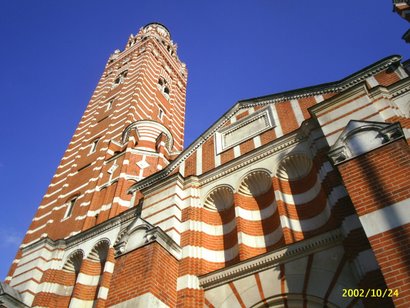The Mosaics of the Blessed Sacrament Chapel


 Following the example of the ancient basilicas of Rome, the founders of Westminster Cathedral housed the Blessed Sacrament in a separate chapel. At all times of day, visitors are to be seen there in prayer, and exposition takes place on Monday afternoons and evenings.
Following the example of the ancient basilicas of Rome, the founders of Westminster Cathedral housed the Blessed Sacrament in a separate chapel. At all times of day, visitors are to be seen there in prayer, and exposition takes place on Monday afternoons and evenings. The mosaics in the chapel were designed as a meditation upon its special purpose. Cardinal Griffin (Archbishop of Westminster 1943 - 1956) had been impressed by an earlier mosaic of St Oliver Plunkett in the Cathedral executed by the Russian artist Boris Anrep (above). Born in St Petersburg, Anrep settled in Paris in 1908, and travelled to London in 1916. His mosaic work was held in high regard, and he designed mosaics for (among other locations) the National Gallery and Tate Gallery. The Administrator, Mgr Gordon Wheeler, approached him, and Anrep's designs were enthusiastically accepted by the Cathedral's art committee in 1956.
The mosaics in the chapel were designed as a meditation upon its special purpose. Cardinal Griffin (Archbishop of Westminster 1943 - 1956) had been impressed by an earlier mosaic of St Oliver Plunkett in the Cathedral executed by the Russian artist Boris Anrep (above). Born in St Petersburg, Anrep settled in Paris in 1908, and travelled to London in 1916. His mosaic work was held in high regard, and he designed mosaics for (among other locations) the National Gallery and Tate Gallery. The Administrator, Mgr Gordon Wheeler, approached him, and Anrep's designs were enthusiastically accepted by the Cathedral's art committee in 1956.
 The many scenes are based on biblical landmarks that lead from Abel to Christ, and which prefigure the Eucharist.
The many scenes are based on biblical landmarks that lead from Abel to Christ, and which prefigure the Eucharist.
 At the entrance to the chapel, two heavenly spirits stand guard; the Archangels Michael and Gabriel. Between them is a three-domed church and a chalice, symbol both of the Trinity and the Eucharist.
At the entrance to the chapel, two heavenly spirits stand guard; the Archangels Michael and Gabriel. Between them is a three-domed church and a chalice, symbol both of the Trinity and the Eucharist. The mosaics were unveiled in 1962, and are a vigorous exposition of Eucharistic theology. They partake of the era in which they were created, underlining the importance of the use of diverse artists and styles in the mosaic decoration of the Cathedral.
The mosaics were unveiled in 1962, and are a vigorous exposition of Eucharistic theology. They partake of the era in which they were created, underlining the importance of the use of diverse artists and styles in the mosaic decoration of the Cathedral.


3 comments:
Fantastic photos!
i'm enjoying your blog and the unique insight it gives to life behin the scenes of our great national cathedral, thank you very much.
i'm interested in the continuing decoration of the builing. i understand that there are currently plans for the completion of the mosaic decorations in the ?holy ghost chapel. it's encouraging to know that small bit by bit the chapels are being finished and the cathedral will not remain in a semi-completed state. i am surprised though that not much information about the plans (and appeals for funds) appears in the cathedral website itself. i'm sure many people (like myself) would be interested to know more about these developments and to have the opportunity to contribute towards the expense. could i suggest that a prominant link be added to the home page of the cathedral website with options on how to contribute (including some credit card option) - currently info can only be found after some searching and only half-heatedly seeks donations. i think if more publicity about the cathedral developments were available that many people would respond favourably and you could be rather surprised. at the moment, the cathedral gives the impression of being a little backwards in coming forward. yet there are many who would willingly donate a little (some, a lot!) if they knew their donation was specifically ring-fence for a specific project.
Dear anonymous
Thank you for your comment - in your honour I've posted on the mosaic decoration today! I will look at the website etc over the summer, and see if we can make the mosaic projects more prominent. Thank you for your interest!
Post a Comment